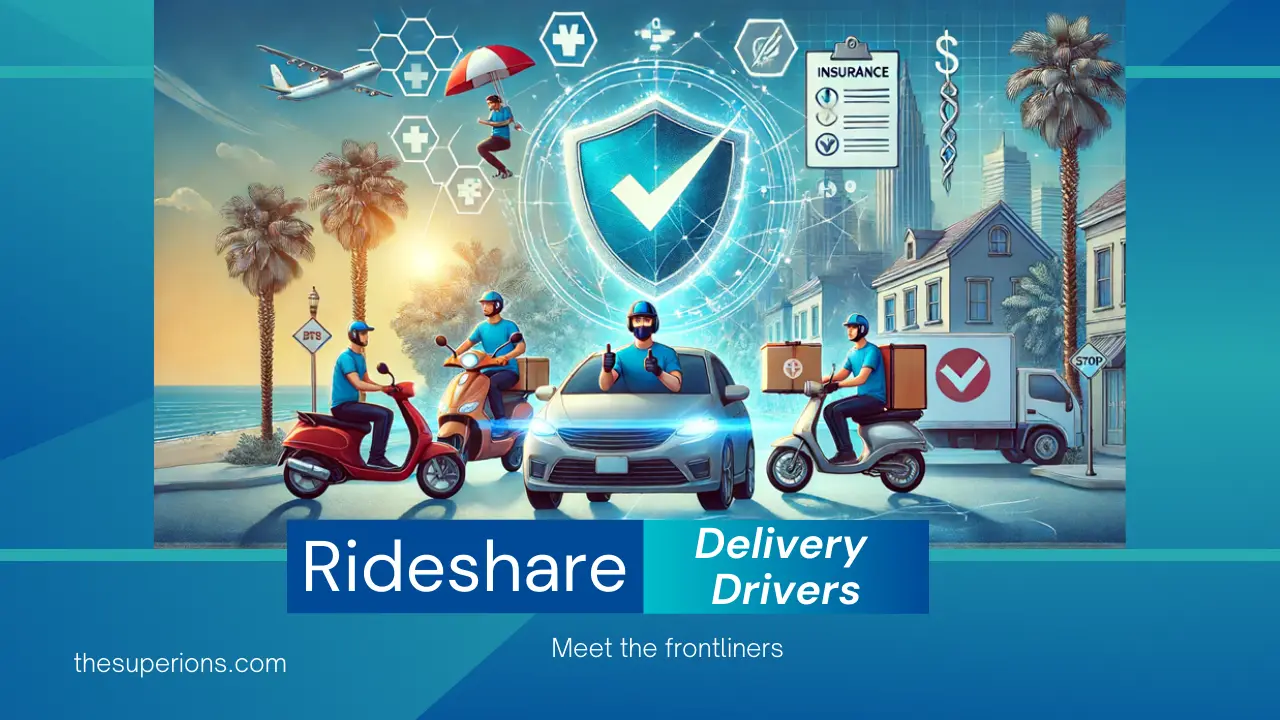Workers’ Compensation Coverage for Rideshare and Delivery Drivers in FL
Navigating workers’ compensation coverage can be complex for rideshare and delivery drivers in Florida. Rideshare and delivery drivers in Florida may qualify for workers’ compensation benefits if they are classified as employees rather than independent contractors. This distinction is crucial as it determines eligibility for compensation benefits.

In Florida, workers’ compensation generally covers medical treatment, lost wages, and rehabilitation costs for those injured on the job. For rideshare and delivery drivers, however, understanding the intricacies of their employment status is paramount. This status not only affects their benefits but also influences how they go about filing their claims.
Employers must adhere to Florida’s workers’ compensation laws, ensuring proper classification and benefit distribution. For many, consulting with professionals, such as Florida workers’ compensation attorneys, can provide essential guidance in pursuing rightful claims. Understanding the process can significantly impact the support and benefits drivers receive after a workplace injury.
People Also Read?
Understanding Workers’ Compensation for Rideshare and Delivery Drivers
In Florida, rideshare and delivery drivers face unique challenges regarding workers’ compensation. It’s crucial to understand eligibility, the intricacies of coverage, and the responsibilities of rideshare and delivery companies.
Eligibility and Classification of Drivers
Rideshare and delivery drivers in Florida are often classified as independent contractors rather than employees. This classification affects their eligibility for workers’ compensation. Under Florida laws, drivers for companies like Uber, Lyft, Uber Eats, and DoorDash are typically not covered by standard workers’ compensation policies.
However, starting January 1, 2023, Transportation Network Companies (TNCs) are required to provide workers’ compensation coverage when drivers are on dispatch or passenger platform time. This change means companies must recognize the risks associated with rideshare and delivery services and offer necessary protections.
Coverage Details and Insurance Policies
The coverage provided to rideshare and delivery drivers under workers’ compensation includes medical expenses, lost wages, and rehabilitation costs due to work-related injuries. This insurance is distinct from personal auto insurance and is more akin to commercial insurance policies designed for business-related activities.
In Florida, rideshare insurers offer optional injury protection, enhancing personal injury protection (PIP) and covering scenarios unique to rideshare and delivery services. For comprehensive protection, companies must carry rideshare insurance that kicks in during work hours, ensuring both the drivers and the passengers are protected.
Rideshare and Delivery Companies’ Responsibilities
Rideshare companies like Uber and Lyft, along with food delivery services such as Uber Eats and DoorDash, hold significant responsibilities. These companies must ensure their drivers are informed about their rights and the available insurance protections.
Starting in 2023, these companies must provide workers’ compensation coverage as mandated by Florida regulations. They are also responsible for maintaining commercial insurance policies that cover the drivers’ active work hours. This obligation extends to communicating with insurance companies to manage and process claims efficiently, ensuring drivers can access the benefits they are entitled to in case of an injury.
People Also Read?
The Reasons Why Truck Drivers Break the Hours-of-Service Rules
Navigating Incidents and Seeking Compensation
After a rideshare or delivery driver accident in Florida, knowing the right steps can help in securing necessary compensation. This includes immediate actions post-accident, understanding the compensation claims process, and handling any legal challenges or disputes that may arise.
What To Do After an Accident
Following an accident, the first step is to ensure safety and call the police to report the incident, documenting all details. Seeking immediate medical attention is crucial, even if injuries seem minor, as they may worsen over time.
Drivers should notify their transportation network company (TNC) or employer about the accident and begin the process of contacting their insurance carrier. Gathering evidence, such as photos of the scene and contact information of witnesses, can be vital for any future claims.
Workers’ Compensation Claims Process
Rideshare and delivery drivers need to be aware of their eligibility for workers’ compensation in Florida. The coverage typically applies during dispatch platform time and passenger platform time. It includes compensation for medical expenses, lost wages, and disability payments.
To file a claim, the injured worker must notify their employer and submit necessary documentation through the appropriate channels, like the Division of Workers’ Compensation. Prompt filing helps expedite the process and avoid delays in receiving benefits for medical bills and other costs.
Resolving Disputes and Understanding Legal Challenges
Disputes may arise concerning the extent of coverage, the severity of injuries, or eligibility for benefits. It’s common for workers’ compensation insurance carriers to challenge claims, necessitating a clear understanding of legal rights and procedures.
Engaging a workers’ compensation lawyer can assist in navigating these challenges, including representing the injured worker in hearings or mediations. Lawyers can help secure fair compensation and resolve disputes related to benefits, ensuring compliance with industry regulations and legal standards.
Being informed and prepared can significantly ease the complexities involved in seeking compensation for rideshare and delivery drivers in Florida.
People Also Read?
How is Indiana Ensuring Safer Transport for All: Tips to Learn From
In Conclusion
Rideshare and delivery drivers in Florida face unique challenges when it comes to workers’ compensation coverage. These drivers frequently encounter barriers due to their classification as independent contractors. This classification often prevents them from accessing traditional workers’ compensation benefits available to full-time employees.
Key Points to Consider:
- Classification Barrier: Many rideshare and gig economy workers are classified as independent contractors, making it difficult to obtain workers’ compensation benefits. This affects their ability to receive coverage for work-related injuries.
- Legal Assistance: Injured drivers may need to seek legal assistance to navigate the complex workers’ compensation system. An experienced attorney can help them understand their rights and potential benefits.
- Varied Coverage: Delivery drivers may have different rights depending on their employment status and the specific terms of their employment. Each case may require careful examination to determine eligibility for workers’ compensation.
Rideshare and delivery drivers should be aware of their legal rights and seek appropriate advice to ensure they receive the benefits they are entitled to under Florida law.





